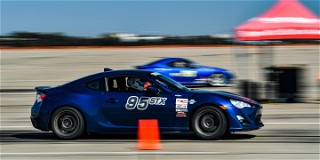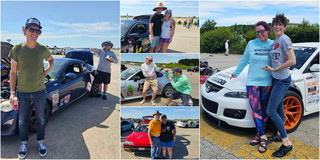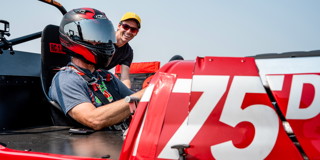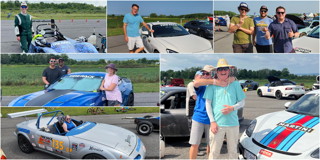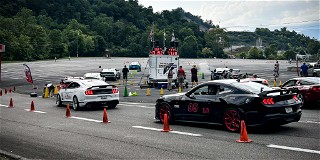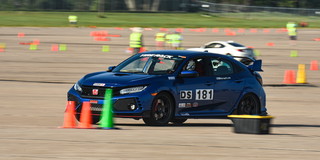
(Each month, Nick Dunlap, the Solo® Events Board (SEB) chair, brings you the latest goings-on as seen by the SEB, including SEB membership changes, explanations of rules adjustments, and more.)
Volunteers. The very thing that makes SCCA® in its current form possible. Without them there would be no way for this organization to operate at the scale it does, putting on thousands of events of varying kinds across all 50 states plus Puerto Rico. As you can imagine, since Solo® events make up a significant portion of the Club’s sanctioned events held every year, there are also a significant number of volunteers in the Solo space. While many of the volunteers are specific to Regional programs, there is a fair number that make up the Solo Events Board (SEB) and the various Advisory Committees (ACs) that are responsible for the SCCA Solo Rules. When it comes to the SEB and those Advisory Committees, there are 60-plus people who impact all the Solo programs around the country.
Speaking wholistically, the hierarchy of the rulemaking process starts with the ACs. The ACs report to the SEB, and the SEB ultimately reports to the SCCA Board of Directors (BoD), who have the final say in the rule changes going into the next year.
The SEB and ACs are volunteers from the general membership. AC members are approved by the SEB, while SEB members are approved by the BoD. The BoD, meanwhile, is elected by the membership – hence the concept of a member-driven organization. Everything in the SCCA (including staff and program boards) reports to the BoD, which is elected by you. (Speaking of which, Areas 1, 5, 7, 8, and 13 are having BoD elections this year, and you can run.)
Back to the topic at hand, if you've ever been curious about the SEB and Advisory Committees and what qualities are valuable and what the work entails, then you're in the right place. But since this is such a gargantuan topic, this month we’re going to dive into the rulemaking process and the role of the SEB’s Advisory Committees. Then next month, we’ll discuss what the SEB does, and how you can get involved.
Making the Rules
Before we move forward, let’s have a brief sidebar on the rulemaking process. I won't go into too much detail as there are already great articles written on the subject (like this one, which is a little old now, but gives you the idea) if you're interested in learning more.
The general flow is that an Advisory Committee will publish a proposal and the SEB will approve it for publication in Fastrack. From there, members provide input on the proposal and it either gets changed, implemented, or withdrawn. Some topics like new car classing or changes to supplemental classes take effect immediately on publication in Fastrack, but, most of the time, the changes are added into the following year’s rulebook after being approved by the BoD.
Let’s Learn About Advisory Committees
Generally speaking, the work on an Advisory Committee is pretty similar across all the ACs. You're given a slice of the Solo program to be an expert in and advise the SEB on that element. Most of the time, this is around the categories that make up the classing structure (like Street, Street Touring, Modified, and so on), but there are Safety, Sound, and Solo Development Advisory Committees as well.
Advisory Committees meet monthly (or sometimes every other month) for an hour or two to go over letters received through the letter system, as well as talk about strategic topics. Occasionally there is some "homework" to do outside of the monthly calls, and the busier ACs will talk regularly outside of the calls to keep up with letters that are coming in, or to work on some of their longer-term objectives.
As you can imagine, the ACs get all sorts of questions. Everything from, "What class is my car in?" to, "Why can't I drive a motorcycle at an autocross event?" Oftentimes, these requests or comments from the membership are specific to one area and can be addressed with a relatively basic response that the AC will discuss and craft. Sometimes they'll play into a much larger strategic effort that the SEB is coordinating across categories.
In addition to responding to letters, the ACs and SEB spend time thinking strategically about the long-term vision of the categories and Solo as a whole. Some of that strategic work is the result of some well-crafted and thought-out letter from a Club member, while other times it starts organically within the BoD, SEB, or an AC.
Some recent results of this strategic thinking are the upcoming integration of modified EVs into Solo, as well as the Club Spec category.
Not all of the committees are focused on cars and rules, though. A great example of this is the Solo Development Advisory Committee, which has seen renewed focus in the past few years. To quote from the SCCA Operations Manual, the SDAC is "responsible to the SEB to serve as a resource to Regions within the Division to assist them with program challenges, including but not limited to growth/expansion, operational matters, site acquisition/maintenance, communications, promotions and training/educational opportunities."
So maybe talking about titanium lug nuts isn't your thing, but helping SCCA’s Regions grow their programs is. For that, the SDAC would love your help.
That’s Only Half the Story
Yes, folks, that was just rulemaking and the Solo Advisory Committees. We’ll be back in a month to dive into what the Solo Events Board does, and how you can get involved.
Photo by Jay Bonvouloir


